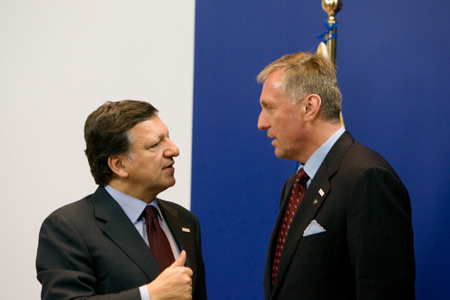The European Union summit on Sunday sought to dispel weeks of gloomy reports that the EU was sliding rudderless towards protectionism and division in the face of the mounting economic crisis.

|
|
Czech Prime Minister Mirek Topolanek (R), whose country currently holds the rotating EU presidency, talks with European Commission President Jose Manuel Barroso at EU headquarters prior to the special summit in Brussels, capital of Belgium, March 1, 2009. The European Union leaders held a special summit focusing on economic recession on Sunday. [Xinhua]
|
The 27 European Union leaders issued a statement roundly rejecting protectionism as a response to the crisis and insisted that those member nations worst affected by the recession would not be left in the lurch.
They threw out a Hungarian appeal for an aid package specially tailored for eastern Europe, but said new members in the east would be held on a case-by-case basis.
French calls for an EU wide auto-industry bailout also found little support, but leaders backed coordinated national support for beleaguered carmakers.
The leaders also agreed on the need to improve regulation of the financial markets to prevent any repeat of last year's financial meltdown, called for common rules to deal with the banking sector's "toxic" assets, and stressed that the current wave of government spending to stimulate the economy should be only a temporary glitch in nations' drive for balanced budgets.
"We should now be able to move forward with a restructuring of the whole banking sector," said Czech Prime Minister Mirek Topolanek, who chaired the three-hour meeting.
Hungarian Prime Minister Ferenc Gyurcsny's dire warnings that the EU risked being divided by an economic "Iron Curtain" unless there was a major support package for eastern Europe fell on deaf ears.
Even Hungary's neighbors among the EU's new member states shied away from call for a 190 billion euros fund to support eastern European nations hit by the crisis. Many are fearful of being lumped together with Hungary and Latvia, who approached the global crisis in a particularly vulnerable situation on account of a big budget deficit, in the first case, and macro-economic imbalances, in the case of Latvia. Both were forced to seek billions in emergency aid from the EU and International Monetary Fund.
"I don't think there is a real need for some sort of specific aid or support to central or eastern European countries," said Estonian Prime Minister Andrus Ansip.
"Those countries they are all so are very different. In some euro-zone member states their difficulties are much bigger than the so-called new member states," he told reporters at the summit.

|
|
European Union leaders pose for a family photo at an emergency EU leaders summit in Brussels March 1, 2009. They are (L to R, second row) Netherlands' Prime Minister Jan-Peter Balkenende, Luxembourg's Prime Minister Jean-Claude Juncker, Latvia's Prime Minister Ivars Godmanis, Italy's Prime Minister Silvio Berlusconi (L to R, first row) European Parliament President Hans-Gert Poettering, Sweden's Prime Minister Fredrik Reinfeldt, Belgium's Prime Minister Herman Van Rompuy and Poland's Prime Minister Donald Tusk.[Chinadaily.com.cn]
|
The ten eastern European nations who joined the EU since 2004 had been booming but the economic crisis has hit them hard with currencies falling, growth contracting and unemployment rising. Western media have likened the situation to that ahead of Latin America's financial collapse in the 1990s, jokingly referring to Hungary as "Argentina on the Danube."